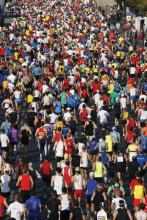STOCKHOLM – Older middle-of-the-pack men and women marathoners do not appear to experience any lasting adverse effects on myocardial function as a result of completing the 26.2-mile distance, according to results of studies of participants in the Berlin Marathon and the Marathon of the Medoc in France presented at the Annual Congress of the European Society of Cardiology.
“The concerns people have about marathon running causing sustained damage to the heart appear to be unfounded. We did not find any harmful effects of marathon running in this very large cohort of amateur runners. Myocardial performance after a marathon seems to be preserved in well-trained persons up to a high age,” Dr. Fabian Knebel said in summarizing the findings of his study of older runners in the Berlin Marathon.
He reported on 167 non-elite, older runners who toed the starting line in Berlin. They averaged 50 years in age, 53 km/week in training, and 14 prior marathons. The finishing time in Berlin averaged 4 hours 23 minutes. All study participants were free of any sort of baseline cardiac disease; 53% percent were women.
The subjects underwent extensive testing including treadmill ECGs, echocardiography with tissue Doppler, and measurement of cardiac biomarkers. The testing was done when subjects were at rest at least 10 days before the Berlin race, immediately after completing the marathon, and 2 weeks later.
The laboratory work showed that all the runners were markedly dehydrated right after the race. However, echocardiograms showed no relevant systolic left or diastolic right heart dysfunction after the marathon. A transient adaptation of diastolic myocardial function was noted, probably in response to the dehydration and prolonged tachycardia.
Fifty-eight percent of the runners had one or more elevated cardiac biomarkers immediately post marathon. Specifically, 21% had an n-terminal prohormone brain natriuretic peptide (NT-proBNP) level above their age-adjusted cut-point, 24% had a troponin T level greater than 0.01 ng/mL, and 13% had elevations in both. These elevated biomarkers were not correlated with training level, contrary to some reports by other investigators who found that inadequately trained runners were more likely to spike elevated biomarkers. Nor did the elevated biomarkers in the Berlin runners correlate with any echocardiographic variables. At follow-up studies 2 weeks post marathon, biomarkers were back to normal in all cases.
Dr. Knebel of Charite Hospital in Berlin noted there is debate among sports medicine researchers as to whether these sorts of elevations in cardiac biomarkers reflect true myocardial damage or simply physiologic adaptation to stress. He believes it’s the latter, given that he and his colleagues could find no echocardiographic evidence of myocardial damage.
“The troponin normalizes so quickly after the race that I don’t think ischemia can be involved. The glomerular filtration rate is considerably decreased after a marathon, and some of the biomarkers are excreted renally, so I think impaired renal function during the race has an impact on the biomarkers. Also, tachycardia and the inflammatory process can lead to liberation of the biomarkers,” the cardiologist said.
In a separate presentation, Dr. Françoise Carré reported on 67 healthy non-elite older women who entered the 2008 Marathon of the Medoc in the Bordeaux region of France. Their median age was 47 years and they trained for an average of 4 hours per week. Their average finishing time was 4 hours 22 minutes. This was the first marathon for 8 women, while 12 women had run more than 10 previously. The investigators obtained ECGs and performed lab tests, including measurement of cardiac biomarkers the day before the race, immediately after finishing, and again 4 hours later.
The women did not become dehydrated during the marathon, as evidenced by their modest mean 500-g weight loss. Nor did they display significant T-wave alterations or any other ECG changes after the event.
“We can say that the marathon race is clinically and electrically well tolerated by middle-aged female runners,” declared Dr. Carré of Rennes (France) University Hospital.
Seven percent of the women runners had a significantly elevated NT-proBNP level in excess of 300 mcg/L immediately after the run. Four percent had an elevated troponin Ic. There was a trend for elevated biomarkers to be found more often in undertrained women. Heart fatty acid binding protein, an indicator of heart muscle breakdown, was elevated in all subjects immediately post-race and at followup 4 hours later. C-reactive protein levels were elevated immediately after the race in all runners, indicating an inflammatory process arose during the long run.



